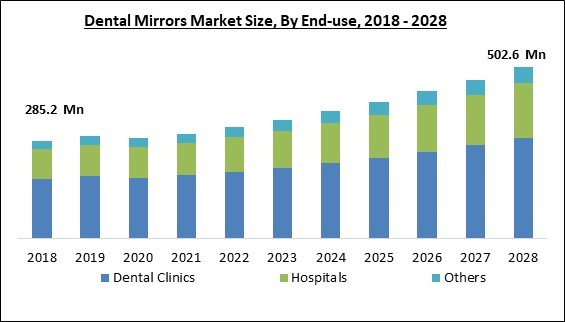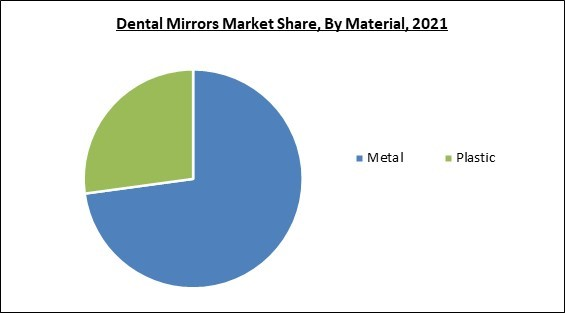The Global Dental Mirrors Market size is expected to reach $502.6 Million by 2028, rising at a market growth of 7.5% CAGR during the forecast period.
Dental mirrors, commonly called dentist's or mouth mirrors, are frequently used dental tools. The concave form of the mirror allows dentists to see patients' mouths in magnified reflection while refracting light. In order to retract the tongue or cheek, the double-sided dental mirror is employed while also providing an indirect view of the opposite side. The dentist can easily see the image since the mirror makes it brighter and larger. Maximum patient comfort, as well as effective cleaning, are made possible by the double-sided mirror's crevice-free design.
Mouth mirrors usually haveround surfaces of mirrors. The mirror number indicates the relative diameter. Most physicians prefer size four or five mirrors for practical reasons. When thesemirror sizes area concern, a number three's modest diameter is used. Because of the unusual bend in the mirror stem, double-sided mirrors aid in visualization, enhance light reflection, as well as are ergonomically advantageous.
As no additional reflective surface obstructs the image, front-surface mirrors offer a cleaner vision with less glare anddistortion. Plain mirrors are a vital tool for dental practitioners and are appropriate for various diagnostic and therapeutic procedures. In addition, they provide the same level of image quality as front-surface mirrors.
Many applications exist for the mouth mirror. The ability of the dentist to see objects indirectly, reflect light towards desired surfaces, and pull back soft tissues are three of its most significant tasks. Two alternative thread norms exist, and they are incompatible with one another. The US norm, which features a taper thread, is mostly utilized in the US, Canada, South Korea, and Spain.
The market research report covers the analysis of key stake holders of the market. Key companies profiled in the report include Kerr Corporation (Envista Holdings Corporation), Henry Schein, Inc., Parkell, Inc. (Lifco AB) (Carl Bennet AB), INTEGRA Biosciences AG (INTEGRA Holding AG), MEDESY SRL, Zirc Dental Products, ASA DENTAL S.p. A., Acteon Group, Essential Dental Systems, Inc., and Carl Martin GmbH.
Dental mirrors, commonly called dentist's or mouth mirrors, are frequently used dental tools. The concave form of the mirror allows dentists to see patients' mouths in magnified reflection while refracting light. In order to retract the tongue or cheek, the double-sided dental mirror is employed while also providing an indirect view of the opposite side. The dentist can easily see the image since the mirror makes it brighter and larger. Maximum patient comfort, as well as effective cleaning, are made possible by the double-sided mirror's crevice-free design.
Mouth mirrors usually haveround surfaces of mirrors. The mirror number indicates the relative diameter. Most physicians prefer size four or five mirrors for practical reasons. When thesemirror sizes area concern, a number three's modest diameter is used. Because of the unusual bend in the mirror stem, double-sided mirrors aid in visualization, enhance light reflection, as well as are ergonomically advantageous.
As no additional reflective surface obstructs the image, front-surface mirrors offer a cleaner vision with less glare anddistortion. Plain mirrors are a vital tool for dental practitioners and are appropriate for various diagnostic and therapeutic procedures. In addition, they provide the same level of image quality as front-surface mirrors.
Many applications exist for the mouth mirror. The ability of the dentist to see objects indirectly, reflect light towards desired surfaces, and pull back soft tissues are three of its most significant tasks. Two alternative thread norms exist, and they are incompatible with one another. The US norm, which features a taper thread, is mostly utilized in the US, Canada, South Korea, and Spain.
COVID-19 Impact Analysis
The manufacturing and supply of dental mirrorswere severely constrained due to the worldwide closure of dental practices and manufacturing facilities. Because there were not enough of the raw materials and inputs needed to make dental mirrors, their supplywas also limited. Also, numerous dentist offices were converted into COVID-care facilities, and various dental operations were interfered with. It was necessary to postpone oral exams, regular cleanings, radiography, cosmetic dental procedures, as well as other orthodontic treatments. In addition, dental treatments were suspended due to the pandemic. These reasons greatly slowed the market's expansion for dental veneers.Market Growth Factors
The rapid emergence of dental tourism
The rise in dental tourism is pushing dental clinics and hospitals in many nations to focus more on quality and employ cutting-edge tools and supplies. These include dental mirrors with advantages such as enhanced visibility, robust construction, and ergonomic design. In order to satisfy the demands of dental professionals as well as the expanding dental tourism business, manufacturers are creating new and cutting-edge goods. The most modern medical technology, highly qualified specialists, low prices for high-quality treatments, and quick turnaround times are some of dental tourism's main benefits. Therefore, the rise of dental tourism is aiding in expanding the dental mirrors market.Oral problems and disease incidence is increasing
The prevalence of oral diseases was particularly high in sub-Saharan Africa. The availability of foods with a high sugar content, insufficient exposure to fluoride in many oral hygiene products or water supplies, and limited access to dental and oral health services are the main causes of this high prevalence. Oral health issues, as well as other non-communicable diseases, are being caused by an increase in sugar-rich foods and beverages, as well as tobacco and alcohol use. This rise has prompted governments and international societies to take steps to reduce this burden. Therefore, the countermeasures taking place to combat the rise of oral and dental problems worldwide are boosting the expansion of the market.Market Restraining Factors
High cost of dental and oral treatments
People may put off having dental treatment because of the large expenses linked with implants, orthodontic surgery, and other operations. Despite this, getting access to even the most fundamental oral health services can be difficult in many countries because of the unequal distribution of dentists and the shortage of appropriate medical facilities to satisfy the needs of the public. Furthermore, the patient's responsibility for payment of dental care costs is often the most significant barrier to treatment. Therefore, the high costs of dental treatments as well as the lack of access to dental care in most regions, are prominent factors hampering the growth of the market.Type Outlook
Based on type, the dental mirrors market is categorized into one-sided, double-sided, and smart. The one-sided segment garnered the highest revenue share in the dental mirrors market in 2021. Since they offer a bigger viewing area without requiring the mirror to be turned over, one-sided mirrors are simpler to operate. Because of this, they are perfect for most dental operations, particularly those that demand a direct sight of the back teeth and difficult-to-reach portions of the mouth. One-sided mirrors also come at various prices and frequently feature ergonomic handles that are comfortable to use and lessen hand fatigue during prolonged treatments.Material Outlook
On the basis of material, the dental mirrors market is divided into metal and plastic. The plastic segment recorded a significant revenue share in the dental mirrors market in 2021. Plastic mouth mirrors are becoming more and more common because of their lightweight, which renders them convenient to use and eases the pressure on the wrist and hand during lengthy treatments. This facts promote the demand for plastic dental mirrors. Dental practitioners that undertake regular and repetitive tasks may find this particularly important. In addition, since plastic mirrors are disposable, they reduce the need for sterilization and cleaning, saving time and money on upkeep.End-use Outlook
Based on end-use, the dental mirrors market is segmented into hospitals, dental clinics, and others. The dental clinics segment witnessed the maximum revenue share in the dental mirrors market in 2021. Throughout the forecast period, the category is anticipated to continue to prevail. Patients can receive high-quality and safe care from such skilled professionals since dental clinics are maintained by certified dental professionals, such as dentists, dental assistants, and dental hygienists qualified to offer various dental services. In addition, it is more convenient and effective for patients to obtain all their dental services in one location.Regional Outlook
On the basis of region, the dental mirrors market is analyzed across North America, Europe, Asia Pacific, and LAMEA. The North America segment procured the highest revenue share in the dental mirrors market in 2021. This is brought on by the high frequency of dental and oral illnesses in the region and the developed healthcare system. In addition, a favorable climate for the industry's growth has been created in North America by the abundance of dental hospitals and clinics and the high degree of dental problem consciousness among the populace.The market research report covers the analysis of key stake holders of the market. Key companies profiled in the report include Kerr Corporation (Envista Holdings Corporation), Henry Schein, Inc., Parkell, Inc. (Lifco AB) (Carl Bennet AB), INTEGRA Biosciences AG (INTEGRA Holding AG), MEDESY SRL, Zirc Dental Products, ASA DENTAL S.p. A., Acteon Group, Essential Dental Systems, Inc., and Carl Martin GmbH.
Scope of the Study
By End-use
- Dental Clinics
- Hospitals
- Others
By Material
- Metal
- Plastic
By Type
- One-sided
- Double-sided
- Smart
By Geography
- North America
- US
- Canada
- Mexico
- Rest of North America
- Europe
- Germany
- UK
- France
- Russia
- Spain
- Italy
- Rest of Europe
- Asia Pacific
- China
- Japan
- India
- South Korea
- Singapore
- Malaysia
- Rest of Asia Pacific
- LAMEA
- Brazil
- Argentina
- UAE
- Saudi Arabia
- South Africa
- Nigeria
- Rest of LAMEA
Key Market Players
List of Companies Profiled in the Report:
- Kerr Corporation (Envista Holdings Corporation)
- Henry Schein, Inc.
- Parkell, Inc. (Lifco AB) (Carl Bennet AB)
- INTEGRA Biosciences AG (INTEGRA Holding AG)
- MEDESY SRL
- Zirc Dental Products
- ASA DENTAL S.p. A.
- Acteon Group
- Essential Dental Systems, Inc.
- Carl Martin GmbH
Unique Offerings
- Exhaustive coverage
- The highest number of Market tables and figures
- Subscription-based model available
- Guaranteed best price
- Assured post sales research support with 10% customization free
Table of Contents
Chapter 1. Market Scope & Methodology
Chapter 2. Market Overview
Chapter 3. Global Dental Mirrors Market by End-use
Chapter 4. Global Dental Mirrors Market by Material
Chapter 5. Global Dental Mirrors Market by Type
Chapter 6. Global Dental Mirrors Market by Region
Chapter 7. Company Profiles
Companies Mentioned
- Kerr Corporation (Envista Holdings Corporation)
- Henry Schein, Inc.
- Parkell, Inc. (Lifco AB) (Carl Bennet AB)
- INTEGRA Biosciences AG (INTEGRA Holding AG)
- MEDESY SRL
- Zirc Dental Products
- ASA DENTAL S.p.A.
- Acteon Group
- Essential Dental Systems, Inc.
- Carl Martin GmbH










